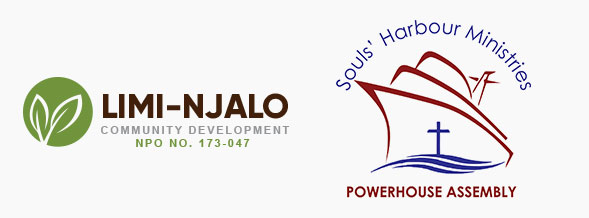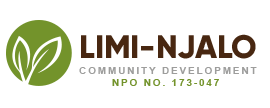Mission statement
To facilitate approach in development of the whole man to maturity spiritually, psychologically socially and physically. To equip communities through the world of God to encourage, love help and support them through daily challenges.
Limi-Njalo Community Development and Soul Harbour Ministries are both organisations that continue to play important role of socialisation to our communities. It fosters respect and obedience to our children at an earlier age, where forums like Sunday schools are formed and wonderfully I shaping our young ones to be responsible people in future it attempting to create an environment where church will be used and function like “Community Base Centre” where it will be also used as a drop Centre for the Department of Health, issues like people will collect their medicines and treatment without fear or walking long distances, also create a center for sustainable development programs for the local community of Umlazi Township in three to four areas in particular Section E, F, and B, C, A.
It aims to focus on skills development as most people areas are under privilege and resides in Shacks houses. Umlazi Township is relatively poor part of the Province which is in need of an overall socio-economic upliftment strategy. The area has several primary schools but very little commercial business to provide employment in the area.
These two organisations have intention to uplift underprivileged community, addressing unemployment issues, FET College, around Durban has been approached to assist, in skill development where convicted people coming out of Prison and disability people will benefit to the same programs.
The main LimiI-Njalo Community Development and Soul’s Harbour Ministries objectives are
As the following
Secondary Objectives: Career youth and others through fellowship every Sunday
OUR GALLERY
See some of our work
We are proud to showcase some of our work to the public as this is what we do best.
SEE OUR VIDEOS
CLICK HEREOur goal
Development of community
Children, youth & Adults
Spiritual upliftment & devotion
Encourage moral regeneration
Training & library resource
To the community with special needs
Creation of opportunities
Develop small business's
Recreational facilities
To inculcate healthy bodies
More about Limi-Njalo
ABOUT US

Soul Harbour Ministries is an non-profit organisation where its chairperson is a co-founder of Limi-Njalo Community Development, he is ordained as a minister of the Gospel of the Lord Jesus Christ-Both organisation are nonprofit organisation which has the same objections vision is to enable the provision of high quality health service to all, especially the poor and the marginalised in South Africa, in the spirit and service of Christ. Its mission is to affirm, develop, support and strengthen both individual health care and in conjunction with all other role player in addressing drugs abuse, crime awareness and serve all people regardless of religion, race, language.
HOW IT WORKS
To facilitate approach in development of the whole man to maturity spiritually, psychologically socially and physically. To equip communities through the world of God to encourage, love help and support them through daily challenges.

To deepen the partnership with government and other stakeholders in regard to our member’s work and through this partnership to act as a voice for the community

To help improve the effectiveness of our members organizations

Focusing on skills development for the underprivileged
Difference in Communities:
A Community can be defined as a group of people who share similar needs and wants. After apartheid ended in 1994, the new government of South Africa sought to provide for basic needs such as running water, electricity, housing and infrastructure for hospitals, police and schools to all communities.
This has been a slow process and although much has been accomplished, there are unfortunately still communities in South Africa that lack this basis services. As a result, many communities have realized that it is up to them to take the initiative and provide for their own needs.
This got hand with the policy of Masakane and sustainable development. The Department of Education has joined the slogan “It takes a village to raise a child” All the people within the community should work together for the greater good of the whole community.
A society consists of communities and the needs of each community will change according to time and circumstances. A community lives together in one area and shares common characteristics and values. It can be made up of many units, schools, age groups, cultural groups and professional groups.
It is interesting to look at the reason why different areas have developed. Towns and cities tend together to grow at a phenomenal rate as the needs and wants of people grow. Often the original reason for existence of a place is forgotten as it changes. Reasons for establishment of towns can vary from trade Harbour and industry to mining, education and natural resources.
A good example is the city of Durban which was started with discovery of establishing Harbours which now has grown to establishing another big Harbour in Richards Bay where most countries are able to transport through the sea. Fortune seekers from all over the world came to trade in South Africa, Durban. These people had wants which needed to be satisfied and as a result, hotels, shops schools and many other buildings sprang up. There were now jobs and people flocked to the area.
This has been a slow process and although much has been accomplished, there are unfortunately still communities in South Africa that lack this basis services. As a result, many communities have realized that it is up to them to take the initiative and provide for their own needs.
This got hand with the policy of Masakane and sustainable development. The Department of Education has joined the slogan “It takes a village to raise a child” All the people within the community should work together for the greater good of the whole community.
A society consists of communities and the needs of each community will change according to time and circumstances. A community lives together in one area and shares common characteristics and values. It can be made up of many units, schools, age groups, cultural groups and professional groups.
It is interesting to look at the reason why different areas have developed. Towns and cities tend together to grow at a phenomenal rate as the needs and wants of people grow. Often the original reason for existence of a place is forgotten as it changes. Reasons for establishment of towns can vary from trade Harbour and industry to mining, education and natural resources.
A good example is the city of Durban which was started with discovery of establishing Harbours which now has grown to establishing another big Harbour in Richards Bay where most countries are able to transport through the sea. Fortune seekers from all over the world came to trade in South Africa, Durban. These people had wants which needed to be satisfied and as a result, hotels, shops schools and many other buildings sprang up. There were now jobs and people flocked to the area.
Standard of Living and Poverty
The standard of living refers to the quantity of goods and service that a household (or an individual) has available for Consumption Poverty – is when the goods and service available to households is less than what is needed to satisfy their basic needs for food, clothing and shelter. These needs are usually expressed in terms of income (money). This income is known as the poverty income. Poverty income varies according to the size of households – the larger the households - the larger the income needs its members out of Poverty.
The poverty income level in South Africa ranges from R551 per month for one person to R2349.00 per month for a household of eight to ten people. Poverty happens in all countries of the world but is worse in the developing countries of Africa. Poverty in KwaZulu Natal is estimated to be 53, 6%.
The poverty income level in South Africa ranges from R551 per month for one person to R2349.00 per month for a household of eight to ten people. Poverty happens in all countries of the world but is worse in the developing countries of Africa. Poverty in KwaZulu Natal is estimated to be 53, 6%.
The Effect of Apartheid Economic Policies
South Africa’s colonial past the main reason for the policies and canes that were introduced After Union in 1910. These policies and laws become generally known as “apartheid”. Apartheid was the policies and practices of separateness. This means that it deliberately kept white people living apart from their black compatriots (fellow citizens). It ensures that only white people could do skilled and well-paid work and do business anywhere in the country.
The result was that most black people in the country were politically excluded from making decision that affected their lives. They were for instance not allowed to vote for a national government.
The result was that most black people in the country were politically excluded from making decision that affected their lives. They were for instance not allowed to vote for a national government.
Redress of Socio-Economic
When the democratic government was elected in 1994, their first job was to change wrong doings of apartheid rule and improve the lives of the millions of poor people living in our country.
The efforts of the government can be divided into two areas: Economic development and growth policies.
Specific redress actions.
The efforts of the government can be divided into two areas:
Development and Growth Policies
These policies are to ensure that the socio-economic imbalances of the past do not continue.
The development Policy is known as the Reconstruction and Development Programme (RDP). Its main aim is to invest in people long-term development and reducing poverty can best be achieved by empowering people to take care of their own needs and aspirations.
The development Policy is known as the Reconstruction and Development Programme (RDP). Its main aim is to invest in people long-term development and reducing poverty can best be achieved by empowering people to take care of their own needs and aspirations.
The Six (6) Aims of the RDP
GEAR was developed for all South Africans and reduces employment.
Five main major programmes to address
Services to members:
- Conferences & workshops
- Where people will get training and knowledge on the topics.
- Create projects, within the organisation
- People will get projects to complete in order to get to the main goals.
- Home-based Care training & support
- Training of Home-based caregivers
- Organizational Skills training
- Training in governance Fundraising, financial management, staff policies, running of caregivers defecting sessions, youth skills development.
- HIV/Aids Prevention & Care
- Training of HIV Counseling and testing (HCT)
Counselors, peer education as support for food gardens, support groups, provision of Nutrition packs.
Support for orphans and vulnerable children, HIV/Tuberculosis prevention and support.

















